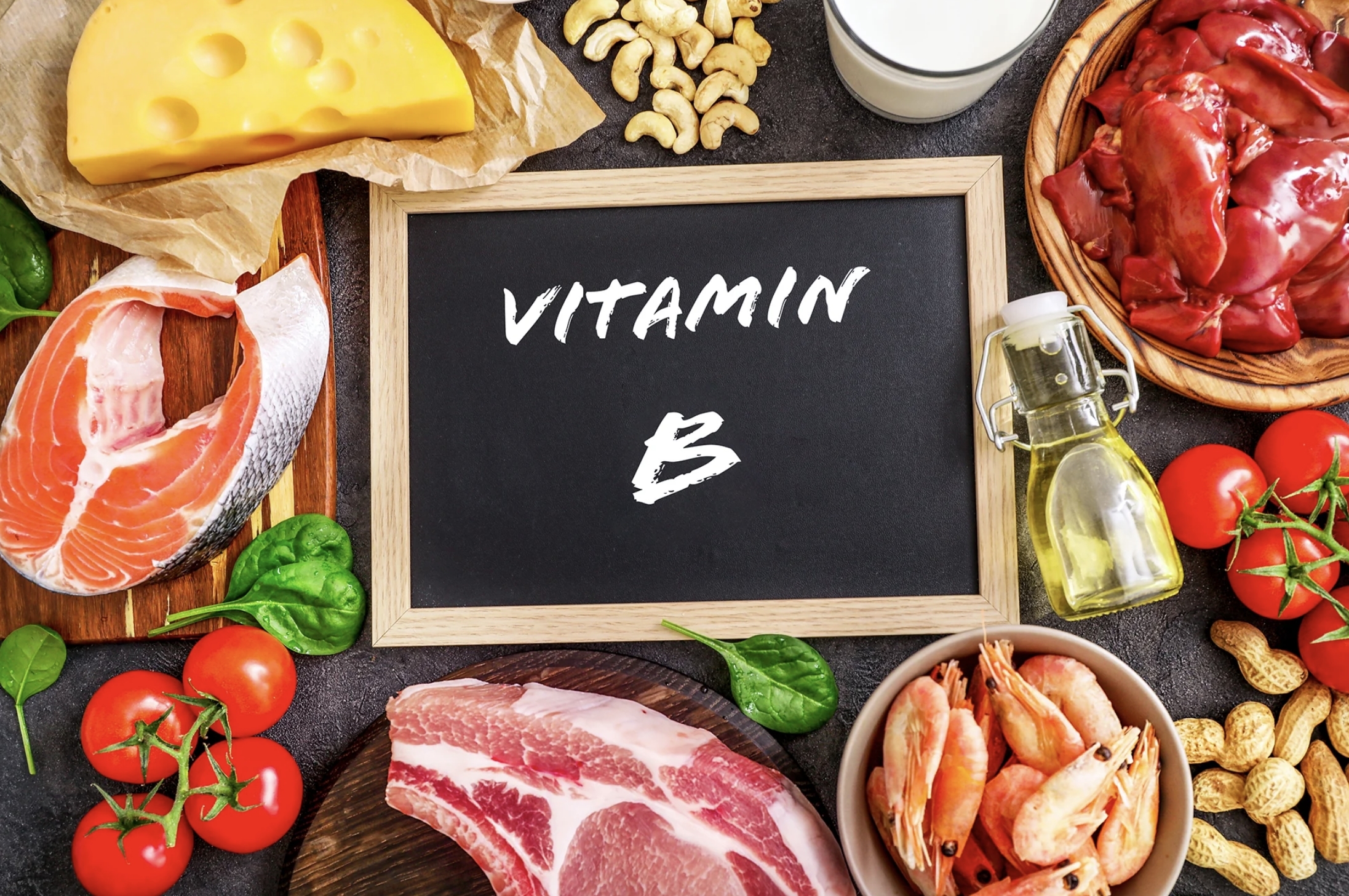Vitamins from the B group consists of eight water-soluble vitamins that are of crucial importance for cellular health, both in catabolic and anabolic metabolism. Although vitamins B6, folate (B9), and B12 are the most well-known B-group vitamins, all eight are interconnected and play an important role in the human body.
How do B-group vitamins maintain cellular health?
B-group vitamins play a vital role in maintaining cell health through their coenzyme functions. They are necessary for the activity of various enzymes involved in fundamental processes that are essential for the normal functioning of cells. These processes include:
- Energy production: B group vitamins are important for catabolic metabolism, which provides energy to cells. They assist in the breakdown of nutrients such as carbohydrates, fats, and proteins, contributing to the production of ATP, the main energy source for cells.
- Synthesis of important molecules: B group vitamins are also necessary for anabolic metabolism, which is responsible for the synthesis of important molecules in cells. They participate in the synthesis of amino acids and methyl groups, which are necessary for carrying out biochemical reactions within cells.
- Oxygen and energy transport: Some B-group vitamins are crucial for the transport of oxygen and energy in cells. They aid in the normal function of red blood cells, which are responsible for delivering oxygen to various tissues and organs in the body.
Additionally, research shows that B-group vitamins have a significant impact on brain health and neuron function. Deficiency in one or more B-group vitamins is associated with psychiatric disorders such as depression and anxiety, cognitive impairment, and dementia.
What are the B-group vitamins?
The eight vitamins from the B group include:
- Vitamin B1: thiamine
- Vitamin B2: riboflavin
- Vitamin B3: niacin
- Vitamin B5: pantothenic acid
- Vitamin B6: pyridoxine
- Vitamin B7: biotin
- Vitamin B9: folate
- Vitamin B12: cobalamin
Thiamine: Vitamin B1
Thiamine (Vitamin B1) performs several important functions in the body. It is responsible for converting food into energy, reducing oxidative stress in cells, and playing a role in cellular growth and development. If thiamine intake is insufficient, mild symptoms such as weakness, loss of appetite, muscle weakness, problems with the nervous system, and cardiovascular system may occur.
Riboflavin: Vitamin B2
Riboflavin (Vitamin B2) plays an exceptionally important role in the body. It participates in energy production, cellular growth and development, fat metabolism, and maintaining healthy levels of homocysteine in the blood. Additionally, riboflavin has antioxidant effects and contributes to the pathogenesis of chronic conditions such as cancer, cardiovascular diseases, metabolic bone disorders, inflammation, and infections. A riboflavin deficiency can manifest as skin disorders, stomatitis, hair loss, and itchy and red eyes. In more severe cases, riboflavin deficiency can lead to liver and nervous system problems. Riboflavin can be beneficial in cancer prevention and reducing migraine headaches.
Niacin: Vitamin B3
In our body tissues, niacin is converted into its active form – nicotinamide adenine dinucleotide (NAD), which is further transformed into nicotinamide adenine dinucleotide phosphate (NADP), a coenzyme. NAD plays an important role in energy transfer from macronutrients (carbohydrates, fats, and proteins) to adenosine triphosphate (ATP), providing energy at the cellular level. NADP is involved in cholesterol and fatty acid synthesis. Additionally, it maintains the antioxidant function of cells. A niacin deficiency can lead to pellagra, a condition characterized by diarrhea, dermatitis, and dementia. Niacin is crucial for neuronal health and is used in conditions such as dementia, neurological deficits, psychiatric disorders, and nerve impairments. Vitamin B3 has significant benefits for the central nervous system and beyond. It supports the genetic modulation of inflammatory and immune processes, reduces oxidative stress, protects DNA, enhances mitochondrial function, and restores mitochondrial health.
Pantothenic Acid: Vitamin B5
Pantothenic acid plays an important role in the synthesis of coenzyme A (CoA) and the acyl carrier protein, which are essential for the production and breakdown of fatty acids, as well as numerous other anabolic and catabolic processes in the body. A deficiency in pantothenic acid is associated with symptoms such as tingling in the hands and feet, fatigue, irritability, sleep disturbances, anxiety, and gastrointestinal disorders. Pantothenic acid can help lower lipid levels in the blood in individuals with hyperlipidemia.
Vitamin B6: Pyridoxine
Vitamin B6 is one of the most well-known and extensively studied vitamins in the B group. It participates in over 100 different enzymatic reactions and performs numerous important functions, including:
- Breakdown of proteins, carbohydrates, and fats.
- Maintenance of healthy levels of homocysteine, a substance associated with heart and cardiovascular health.
- Support of the protective functions of the immune system.
- Enhancement of cognitive development.
- Involvement in gluconeogenesis and glycogenolysis – the processes of glucose formation and breakdown for energy production.
- Formation of hemoglobin – an important component of red blood cells responsible for oxygen transport in the body.
The intake of vitamin B6 has been shown to reduce symptoms of premenstrual syndrome, alleviate morning sickness in pregnant women, and improve cognitive function and memory. This vitamin is also associated with the prevention of various diseases, including cancer and cardiovascular disorders, due to its ability to maintain homocysteine levels.
Biotin: Vitamin B7
Biotin is an essential coenzyme involved in the metabolism of fatty acids, glucose, and amino acids. It aids in catalyzing various steps in these metabolic processes. Additionally, biotin plays a crucial role in gene regulation and cellular signaling.
Biotin deficiency is rare, but its symptoms include thinning hair, the appearance of scaly red rashes on the body, skin infections, depression, brittle nails, and others. Biotin deficiency is often associated with deficiencies of other B-group vitamins or other nutrients.
Biotin is frequently used to maintain the health of hair, nails, and skin. Therefore, it is found in many cosmetic products that aim to preserve a beautiful appearance.
Folate: Vitamin B9
Folate plays an important role in the therapy of megaloblastic anemia and is recognized as a crucial supplement for pregnant women. It performs multiple key functions in the human body, including nucleic acid synthesis (DNA and RNA), cell division, amino acid metabolism, and red blood cell formation. Pregnant women typically need to increase their folate intake. Deficiency of this vitamin during pregnancy is associated with an increased risk of low birth weight, delayed fetal growth, premature birth, and neural tube defects in the baby.
Vitamin B12: Cobalamin
Similar to folate, vitamin B12 is necessary for the formation of red blood cells and DNA. It also plays a vital role in the development and functioning of the brain and nerve cells. A deficiency of this vitamin can manifest as megaloblastic anemia, which is characterized by insufficient production of red blood cells.
Moreover, vitamin B12 deficiency can lead to other symptoms, including fatigue and weakness, nerve damage manifested by tingling in the hands and feet, memory loss, dementia, loss of balance, depression, and muscle cramps. Low levels of vitamin B12 are associated with an increased risk of cognitive dysfunction, cardiovascular diseases, and osteoporosis.
What are the good sources of B-group vitamins?
B-group vitamins are present in a wide range of foods that we consume daily. Animal products such as meat (beef, pork, chicken), fish (salmon, tuna, shrimp), eggs, and dairy products (milk, cheese, yogurt) are good sources of B-group vitamins, including vitamin B12. Additionally, red meats are rich in vitamins B1 (thiamine), B2 (riboflavin), and B3 (niacin).
From plant-based sources, whole grains like whole wheat, rice, and oats contain significant amounts of B-group vitamins, including B1, B2, B3, B5 (pantothenic acid), and B6. Hazelnuts, almonds, and seeds (peanuts, sesame) offer a rich content of vitamins B1 and B3, while leafy vegetables (spinach, cabbage, broccoli) contain vitamin B9 (folate).
Vegetarians and vegans often rely on fortified foods that are enriched with B-group vitamins, such as bread, cereals, pasta, and rice. These products are processed with B-group vitamins to enhance their nutritional content.
It is important to note that vitamins from the B group are sensitive to heat and light. Pay special attention to the cooking of foods that contain these vitamins – this way, you will preserve the vitamins they contain to the greatest extent possible.

